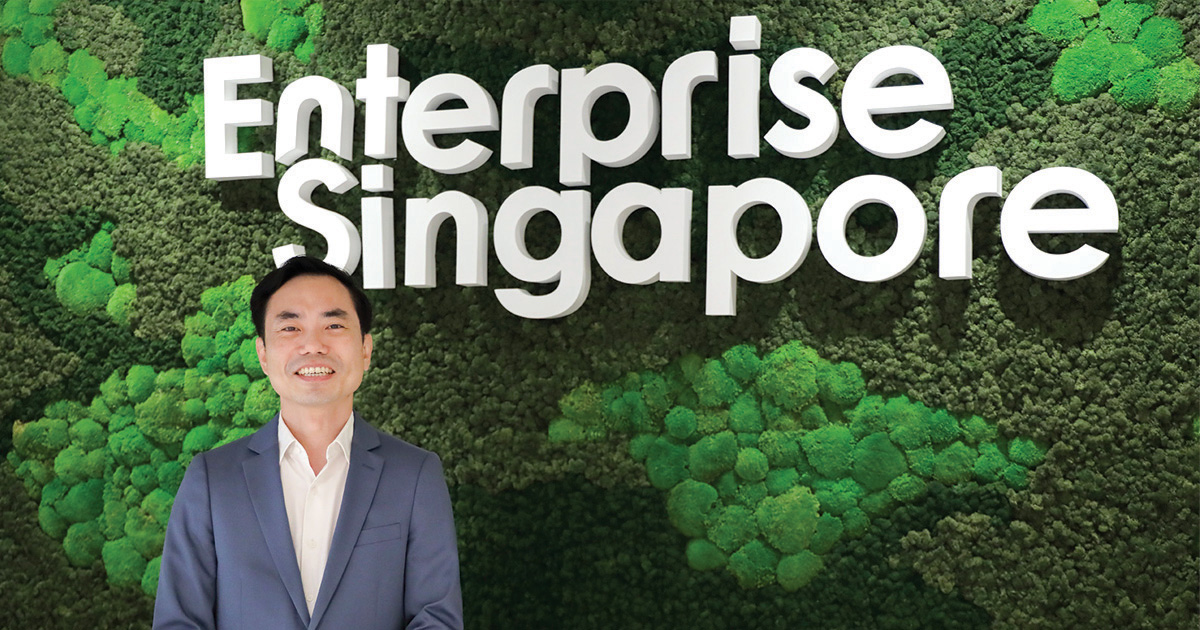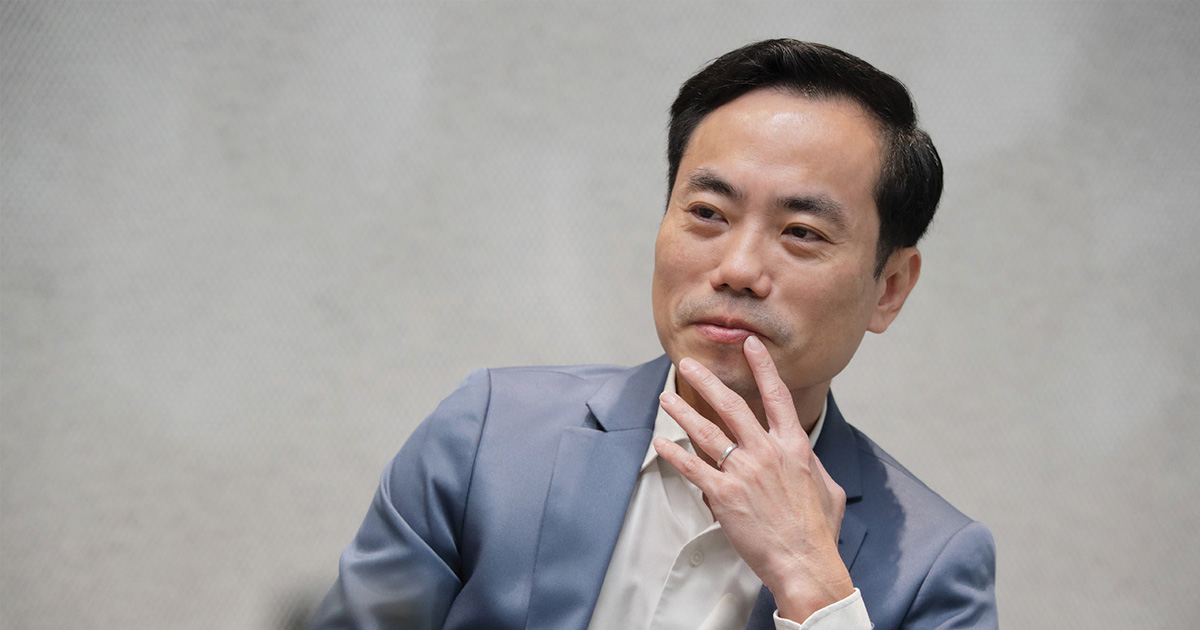Keep Growing – this is our clarion call within and beyond Enterprise Singapore.
It’s about breaking out of our comfort zones, challenging the status quo and continuously learning to become better versions of ourselves.
In the first installment of our Keep Growing Conversations series, we speak to Assistant Chief Executive Officer, Lee Pak Sing. Helming the Trade, Connectivity and Business Services portfolio, he is in charge of helping Singapore develop as a global trading hub and helping transport, logistics and the services industry to grow. He is also a key driver for the Trade 2030 strategy, whose aim is to widen and deepen Singapore’s trade with the world.

Hi Pak Sing, you’re currently an ACEO with Enterprise Singapore.
Have you always been in public service? Please share your journey with us.
I have been in public service for over 20 years. I was awarded a scholarship by the Economic Development Board (EDB) and upon graduating with a degree in Economics, I started work there. I have also had stints at the Ministry of Trade and Industry (MTI) and Ministry of Manpower (MOM), and what was then the Ministry of Community Development, Youth and Sports (MCYS) among others.
I count myself very fortunate as my first job at EDB gave me many opportunities to connect with different industries, cultures and countries. Through international relations, I gained a global perspective and have benefited greatly from the experience. To this day, it continues to guide me in my role to establish Singapore as a global trading hub.
Can you share an experience that stands out for you?
While at MCYS, I was part of the organising team that developed the first Youth Olympic Games (YOG) that was held in Singapore in 2010.
The values of the Games are Excellence, Friendship and Respect. I remember clearly that we set out not just to put athletic excellence on display, but we were also very mindful about showcasing the cultures of all participating countries with our youth and educating them about diversity.
The intent was not to force it upon them but to allow for experiential learning. So working with the Ministry of Education, we paired different schools to different countries. I remember most fondly schools who “adopted” countries that they ordinarily would not have interactions with. For example, countries like Ghana or Antigua and Barbuda. As early as two years before the Games, they researched their language, food and history. In doing so, they got to know more about the culture of the athletes from these countries even before they arrived. And when they finally did, the Singapore students shared what they learned about them. You can imagine how pleasantly surprised and happy the Ghanian and Antigua and Barbuda athletes were to see that a country in Southeast Asia knew so much about them! The students even went to the stadiums to cheer them on. And just like that, friendships were forged.
And just as with YOG, I try to infuse values into the work we do at Enterprise Singapore. I share with my team that beyond the mandate of helping our businesses to grow, we must have genuine respect and appreciation for different cultures and people. For Singapore to be a global trading hub, we must embrace diversity.

You’re now driving the Trade 2030 Strategy. Can you share what that is and why is it important for Singapore?
Singapore was founded on trade and it remains a key pillar of our economy. Even as a small nation, we are already the number one financial and commodity trading hub in Asia. Trade 2030 is about widening and deepening the trade activities Singapore has with the world.
Widening – to open up an even greater diversity of goods traded. The current volatility of world events is a timely reminder that disruption can happen at anytime and anywhere. Diversification is important for trade resilience.
We also need to move with the times. With the drive towards sustainability, we need to quickly make room to trade electric vehicle metals, biofuels and renewables.
Deepening – to build a community of counterparts in Singapore such as attracting even more of the world’s biggest global traders to be based here. It is also about continuing to build and facilitate an array of accompanying specialist services from finance, insurance, legal, logistics and more to support the entire ecosystem.
What does this mean for Singapore?
For one, it’s about more opportunities and better paying jobs for our people.
Currently, the wholesale trade sector already provides over 300,000 jobs. Having more goods and services flowing into, through and out of Singapore will spur more business activity and continue to drive our economy. And the advent of technology and digitalisation will in turn create even more high value jobs. One marker of success for me would be to see more young people telling their parents that they see a bright future in the sector and want to join it!
Beyond job opportunities, it is also about Singapore’s constant evolution to be the epicentre of trade. With our many Free Trade Agreements with nations around the world, our accessibility and open economy, we will continue to anchor ourselves as the place that welcomes global talent to live, work and play. This will further add to the vibrancy and diversity of our country.
Now that we know what you do at work, tell us something that people may not know about you?
I’m a nature lover and enjoy hiking - walking under the forest canopy, taking in the fresh air and having the tranquility to think. I’m also a plant daddy. I think I have between 20-30 plants but honestly, I’ve lost count.
I’ve learned so much from caring for plants.
They’ve taught me that there are no “good” or “bad” ones. They just need the right conditions. Some like direct sunlight while others prefer to be in the shade. Others are thirsty and like to be watered regularly, while some prefer the soil to be dry.
This is just like managing a team in an organisation. Some staff perform best under the heat of the spotlight while others thrive in a supporting role. I think that as a leader, it’s about helping them feel comfortable and creating the right environment for them to blossom.
Finally, what is your philosophy on how to keep growing?
Be curious, open and listen to other people.
I travel often and beyond my work, what I enjoy most is learning about different cultures. It is exactly because they are different that makes them wonderful.
From discussing inter-faith marriages in Abu Dhabi, to why croissants in France will always taste better than in Singapore, to sharing favourite books with business leaders around the world, all these learnings enrich the tapestry of our own experiences. And by sharing, they would also learn a little more about me, and our beautiful Singapore. The world is much smaller when we embrace one another.
--For more on how we can support your business to #KeepGrowing: Grow your business with Enterprise Singapore (enterprisesg.gov.sg)

